Fist of Fury (1972)
Directed by: Lo Wei
Written by: Lo Wei
Starring: Bruce Lee, James Tien, Lo Wei, Nora Miao
AKA JING WU MEN, THE CHINESE CONNECTION
Hong Kong
AVAILABLE ON BLU-RAY AND DVD
RUNNING TIME: 102 min
REVIEWED BY: Dr Lenera, Official HCF Critic
SPOILERS!
Shanghai 1908 when it was ruled by the victors of the Boxer Rebellion. Chen Zhen returns to Jingwu School to marry his fiancée Yuan Li’er. However, tragic news awaits him: his master Huo Yuanjia has died, apparently from illness. During the funeral, people from the nearby Japanese Hong Kou School arrive to taunt the Jingwu students and present a sign bearing the words “Sick Man of East Asia”, as well as issuing s challenge. Chen returns the sign, defeats all the Japanese, and makes the students who taunted him earlier them literally “eat their words”. But the Japanese demand that Chen is handed over to them. Then Chen discovers that Huo had actually been poisoned by Tien the cook, working with the Japanese….
A student setting out to avenge his master’s death is one of the most commonly used premises in martial arts cinema, and the idea of rival schools isn’t that far behind, so Fist Of Fury, which was originally called The Chinese Connection in the US and the UK, isn’t really as original as The Big Boss, and to me seems heavily inspired by The Chinese Boxer starring Jimmy Wang Yu who was an early Hong Kong martial arts star. It is though a much more polished production than its predecessor, with writer/director Lo Wei making a good attempt to top the earlier film and succeeding, while Lee is now totally in command of his skills which don’t just include martial arts. The fighting is of a far higher standard and the message of how violence doesn’t always get good results is intriguingly complicated by the fact that its hero seems borderline psychopathic yet you’ll still behind him, while the very patriotic, anti-Japanese tone [one major Japanese character even sports a Stalin moustache] can just be translated to a cry against oppression everywhere. The last five minutes are the best non-fighting five minutes in all of Lee’s movies and the very final shot perhaps the most powerfully symbolic representation of Lee and all that he stood for. Fist Of Fury is only seriously weakened by some uneven pacing and a sense of marking time around the middle.
Chen Zhen, a character later played by Donnie Yen, Jet Li and others, was not a real person, but his master Huo Yuanjia was, and Chen was inspired by one of Liu’s pupils Liu Zhensheng. Again Lo Wei wrote and directed, though this time Lee had a bit more control; he was allowed to choreograph all the fights except for the sole one he didn’t appear in, and to even bring in one of his students Robert Baker for the climactic action. Though mainly shot at the Golden Harvest Studios in Hong Kong, some footage was filmed in the real Hong Kou district and the Luis de Camoes Gardens, Macau, where a local gang demanded payment for using their territory. To the irritation of Lee, who had to be physically restrained by many from attacking the gangsters, the protection money was paid. Lee and Wei fell out over a number of reasons, one of them being Wei’s sledgehammer political commentary which Lee felt was too blunt, and towards the end of shooting they didn’t speak at all. As well as appearing in a single shot earlier on [training in a courtyard], a certain Jackie Chan doubled for Riki Hashimoto when he’s kicked through a paper window. The film did even better than The Big Boss. In the UK, it was released before that movie and wasn’t initially censored. Then in 1978 BBFC head James Ferman decided that nunchukus [chain sticks] should not be allowed to be seen in films and the video version was cut by nearly three minutes.
The initial response to Chen going a bit crazy when he finds that his master is dead is that Lee is way overacting, but watching the film with [I hope] more observant eyes hints that Chen is slightly unbalanced anyway, and is certainly not quite ‘right’ from the beginning of the events of the film. He’s almost catatonic until the arrogant Japanese turn up to make trouble, and you know that, unlike in The Big Boss, it won’t be long before Lee’s character starts to kick arse. Seeing him defeat a whole dojo is still an amazing sight, shot in long takes so you see Lee knock down several opponents before a cut, and not without some sly humour such as when Lee knocks at the legs of his opponents with his nunchuku. Lee is just as ferocious as before, but this film now adds the war cries and Lee often removing his top, exploiting his sexuality which was virtually new for the genre. The crowd pleasing moment of Chen smashing the offending sign and shoving the paper into Japanese mouths is then topped by Chen kicking into bits a street sign that forbids dogs and Chinese in a park. However, this is a film slightly more rooted in the real world than normal, and Chen’s actions get him into trouble. We don’t just have Hong Kou students attack Jingwu school and defile the shrine dedicated to Huo, but the Japanese authorities want Chen handed over and both the police and the other Jingwu members are under pressure to locate him.
Once Chen discovers that Huo was poisoned, Fist Of Fury slows down considerably, partly because Wei has clearly beefed up his character, Inspector Lo, as much as he can. Baker’s character Petrov is given a not-entirely-necessary scene where he bends bars and pushes nails into a wooden board with his hands, though I suppose it does help set him up as a worthy opponent for Chen. The ten or so minute scene between Chen and Yuan almosts bring the pacing to a halt, but it’s nicely written as they talk of their dreams and what to do, and is performed very naturally by Nora Miao [given the major female part this time] and Lee, the latter really showing what a good actor he could be, even if elsewhere he’s sometimes too prone to pulling odd faces. Chen putting on some disguises to see what’s going on and to infiltrate the Japanese headquarters isn’t entirely needed but is fun and Lee even seems to be impersonating Jerry Lewis for a while when he pretends to be a telephone repairman. Eventually Chen does enact his vengeance, but by now his doings have led to a domino effect of cascading repercussions and he decides to give himself up. First Chen says farewell to his surviving co-pupils, and then to Yuan, but the exchanges are silent. No words are necessary when looks can say everything. Yuen seems to give a: “We could have been together” look. Chen’s return look appears to say: “I am sorry, but you know it has to be this way”. They clearly know each other well enough to know exactly what was being said without having to actually say it. It’s just great. Chen then makes Lo promise that the school will be spared, and then he walks outside to where crowds are cheering but also towards where police with guns are waiting. Rather than submit to the humiliation of a trial which he has no chance of winning, he runs towards the guns and the movie ends on a freeze frame of him doing a jump kick at the audience. It’s so damn powerful that only afterwards does one wonder at the collateral damage that that firing squad, positioned as it is, would cause.
Lee’s climactic battles with Baker and Hashimoto are very good and show how Lee tended to be different with his lengthy fights. It was common to have the villainous character[a] in a final fight have the upper hand for some time before the hero finally came out on top, but Lee tends to either have his character clearly superior frrom the start [as in the Baker fight] or almost evenly matched [like in the Hashimoto one]. While even a first time viewer can tell that the same street set is being used slightly redressed over and over again, and a sunrise shot used twice in The Big Boss reappears here, overall Wei does a good job with the movie and even provides some stylistic traits like slow motion and Chen moving his arms in a sort of motion blur special effect, though it’s possible that these were Lee’s ideas. There’s no unrealistic trampolining this time, and the only really silly scene is when Chen lifts up and hurls a rickshaw with somebody in it, though one almost believes that Chen’s rage can make him do this. Chen really is a walking firecracker throughout – it’s amazing that he can be calm the times that he is and seem almost ‘normal’ when he’s with Yuan – and the script makes it clear that, despite him representing nationalist pride to a nation which had often been ruled by other countries and whose citizens had often been made to feel like strangers in their own cities, his actions cause more damage than anything else. You could call this aspect of the film confused. I call it smart and ambiguous. There are no easy answers.
The only really hammy performance is by Paul Wei as Wu En, the translator for Hiroshi Suzuki the master of the Hong Kou dojo, though he’s such a disreputable, low character that it almost seems fitting. This time Joseph Koo, who wrote some music for the 1983 Cantonese version of The Big Boss, was given the job of writing the whole score and it’s pretty good, with a rousing main theme which doubles as a tender love theme, some really menacing passages and even some unusual percussion. While for me it could do with some serious tightening around the middle and its plot is somewhat well worn, while come to think there’s some odd chronology in at least one section which doesn’t really link up, as if a few scenes were placed in the wrong order, overall Fist Of Fury still holds up and has dated far better than many similar films of the time, partly it lacks much of the goofiness which – for good or bad – was common. Fans generally seem to pick either Fist Of Fury or Enter The Dragon as the greatest Lee movie. While I love both, I feel that Enter The Dragon just has the edge in terms of entertainment, though, perhaps true to form, I regard another one of his pictures as his defining testament on film.

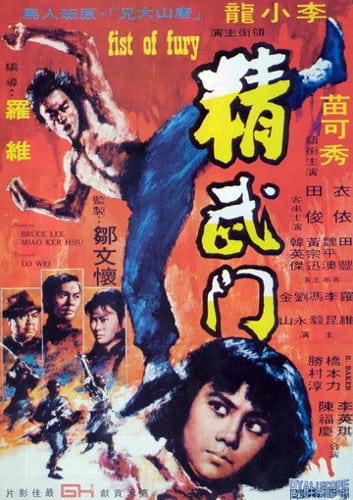
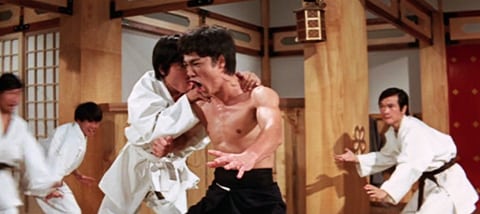
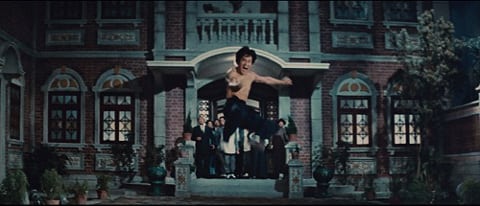



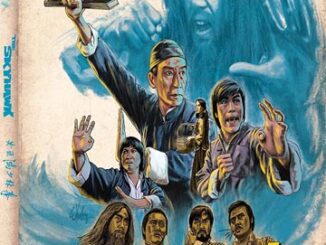
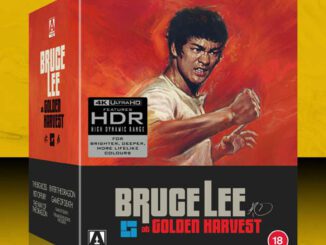
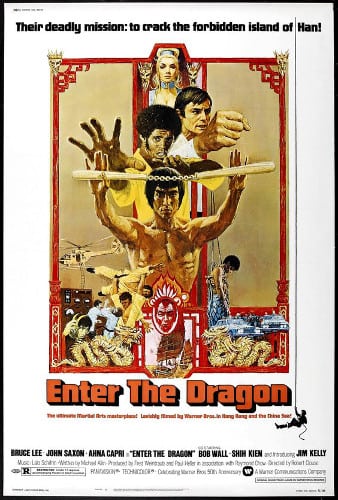
Be the first to comment